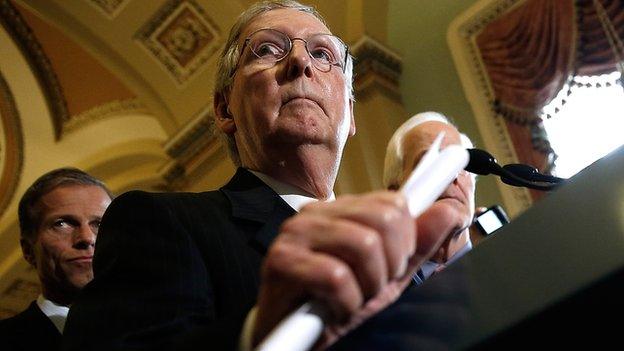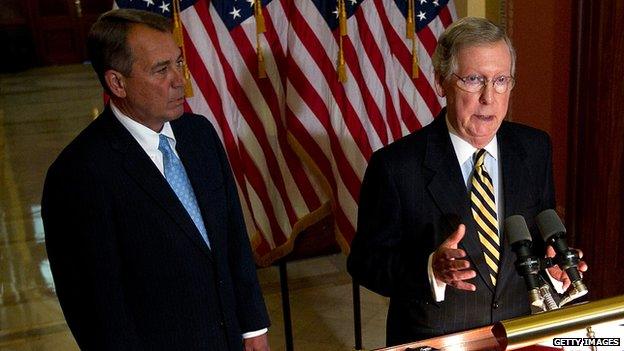What difference would a Republican Senate make?
- Published
- comments

Mitch McConnell is in line to become Senate majority leader if his party wins enough seats this November
It's simple electoral maths that the Republican Party has a good chance to control a majority in the US Senate after November's mid-term elections.
Six seats have to change hands for this to happen, and three - South Dakota, Montana and West Virginia - are almost certain to be Republican pickups. Out of the remaining 33 races, 10 are currently considered close, with Democrats defending seven of them.
As most experts predict conservatives will easily maintain their edge in the House of Representatives, the "battle for the Senate" has dominated discussion. As election day draws near, however, a quiet debate is simmering over what Republican control of Congress actually would mean.
At first blush the answer seems to be that it would matter a great deal. Nevada Senator Harry Reid, a talented parliamentarian who has long been a thorn in conservative sides, would be out as majority leader. He would be replaced by a Republican, likely Mitch McConnell - assuming the Kentucky senator wins his re-election (one of the 10 aforementioned close races).
Once fully in power Republicans would be able to embed policy changes into larger budget bills. President Barack Obama would no longer have a Democratic Senate to block conservative legislation on border security, energy policy, healthcare and financial regulation from reaching his desk.
"During budget negotiations, when setting the legislative agenda and when discussing Obamacare, the president would be the only centre of power representing the progressive point of view," writes, external the National Review's Charles CW Cooke.
While Mr Obama could veto stand-alone bills, he may be more reluctant to strike down a larger bill that keeps the government funded.
"Government shutdowns have generally hurt Republicans in recent years, and the party has tended to fold in the end," writes, external David Leonhardt of the New York Times. "But the politics could be different if the forcing mechanism were Mr Obama's veto."
At the very least it could make the president more willing to accede to Republican demands on topics like construction of the Keystone XL Pipeline.
The Senate also is responsible for confirming presidential nominees to the executive branch and the courts. Thanks to a change in Senate rules in late 2013, most of Mr Obama's selections have been able to be confirmed by a simple majority. With Republicans in control, Leonhardt says, this process could grind to a halt.
A Supreme Court nominee still requires 60 votes to be seated, but he or she will face additional procedural hurdles if Republicans have a majority in the Senate.

House Speaker John Boehner may find it difficult getting his chamber to co-operate with a Republican-controlled Senate
The Washington Post's Charles Krauthammer says, external a conservative takeover also has less direct benefits. It allows the party to more clearly set out its agenda. Up until now Republicans have been defined by their opposition to Mr Obama. While that was a necessary role for the minority party, he says, Republicans have to change their focus if they aspire to govern.
"Winning control of the Senate would allow Republicans to pass a whole range of measures now being held up by Reid, often at the behest of the White House," he writes.
Congress could lay out a framework for the 2016 presidential race by advancing a programme of tax reform, energy policy, border security and healthcare, he says.
"If the president signs any of it, good," he writes. "If he vetoes, it will be clarifying."
Salon's Elias Isquith worries that Republican control of the Senate will embolden far-right conservatives in the House to step up their pressure on Speaker John Boehner, giving a more aggressive bent to a chamber that's already solidly conservative.
"If Boehner was willing to drift into the abyss less than a year after the GOP's disappointing performance in the 2012 elections, when Obama's approval rating was considerably higher than it is today and when the Senate was in the Democrats' control, what might he do next year, with a Republican Senate and a triumphant, cocky GOP base?" he asks.
There is, however, a contrarian belief that Republican control of the Senate is exactly what Democrats need going into a presidential election cycle.
The Washington Post's Paul Waldman sees, external a more radicalised House as a boon to Democrats if its members sharply break from a more practical Senate.
"The House, still dominated by extremely conservative Republicans for whom any hint of compromise is considered the highest treason, could continue to pass one doomed bill after another, while the Senate tries to write bills that have at least some chance of ever becoming law," he writes.
Bill Scher of Campaign for America's Future says, external that conservatives will tear themselves apart trying to devise an agenda that satisfies its grassroots Tea Party base and its big-business, establishment interests.
"The inconvenient truth for the Republican Party is that it's not ready for prime time, yet it's on the verge of fully sharing with the president the responsibility of running the country," he writes for Politico.
In the two years since Mr Obama's re-election, Republicans haven't been able to come up with a political agenda, he says, and there's no reason to think control of the Senate will change that.
"To tackle any issue head-on with the slightest bit of specifics risks alienating either the pragmatists or the purists," he writes. "That tells you all you need to know about how tenuous the Republican governing coalition will be."
The Boston Globe's Michael A Cohen says a Republican victory would be a "poisoned chalice" that would fracture the Senate Republican caucus.
"There will always be at least one Republican senator from the right (and likely more) who will see some political benefit in opposing whatever McConnell wants to do," he writes. "Ideally, Republicans would be working to pass reasonable legislation like immigration reform to improve the GOP's image with Hispanic voters, but that's simply not going to happen."
A switch in Senate control, beneficial for Republicans or not, may be short-lived. In 2016 conservatives will have to contend with a much more formidable set of Senate contests, the result of upset wins in 2010 mid-term races.
"Winning control of the Senate for the next two years isn't going to be a 'poisoned chalice' for the party because they will likely have control for such a short time that it won't matter," the American Conservative's Daniel Larison writes, external. "It will be something for them to enjoy briefly before handing it back to the other side."
A win is a win, however. Fleeting power is still power. A Republican controlled Congress may be fraught with danger, but putting enough wins on the board to hold a congressional majority is something to build on two years after Republicans were soundly defeated in a presidential election.
Even a poisoned chalice can look nice in the trophy case.